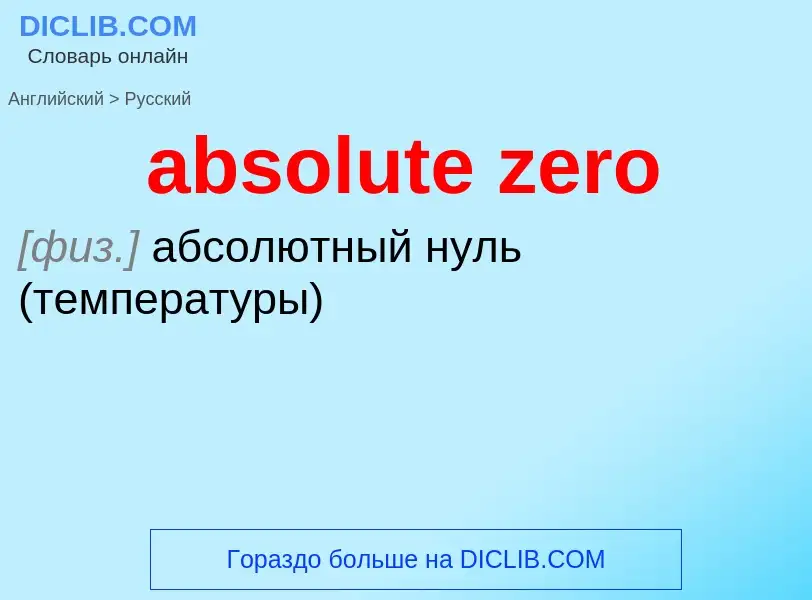Translation and analysis of words by ChatGPT artificial intelligence
On this page you can get a detailed analysis of a word or phrase, produced by the best artificial intelligence technology to date:
- how the word is used
- frequency of use
- it is used more often in oral or written speech
- word translation options
- usage examples (several phrases with translation)
- etymology
absolute zero - translation to russian
физика
абсолютный нуль (температуры)
Definition
Wikipedia
Absolute zero is the lowest limit of the thermodynamic temperature scale, a state at which the enthalpy and entropy of a cooled ideal gas reach their minimum value, taken as zero kelvin. The fundamental particles of nature have minimum vibrational motion, retaining only quantum mechanical, zero-point energy-induced particle motion. The theoretical temperature is determined by extrapolating the ideal gas law; by international agreement, absolute zero is taken as −273.15 degrees on the Celsius scale (International System of Units), which equals −459.67 degrees on the Fahrenheit scale (United States customary units or imperial units). The corresponding Kelvin and Rankine temperature scales set their zero points at absolute zero by definition.
It is commonly thought of as the lowest temperature possible, but it is not the lowest enthalpy state possible, because all real substances begin to depart from the ideal gas when cooled as they approach the change of state to liquid, and then to solid; and the sum of the enthalpy of vaporization (gas to liquid) and enthalpy of fusion (liquid to solid) exceeds the ideal gas's change in enthalpy to absolute zero. In the quantum-mechanical description, matter (solid) at absolute zero is in its ground state, the point of lowest internal energy.
The laws of thermodynamics indicate that absolute zero cannot be reached using only thermodynamic means, because the temperature of the substance being cooled approaches the temperature of the cooling agent asymptotically. Even a system at absolute zero, if it could somehow be achieved, would still possess quantum mechanical zero-point energy, the energy of its ground state at absolute zero; the kinetic energy of the ground state cannot be removed.
Scientists and technologists routinely achieve temperatures close to absolute zero, where matter exhibits quantum effects such as Bose–Einstein condensate, superconductivity and superfluidity.

![The rapid expansion of gases leaving the [[Boomerang Nebula]], a bi-polar, filamentary, likely proto-planetary nebula in Centaurus, has a temperature of 1 K, the lowest observed outside of a laboratory. The rapid expansion of gases leaving the [[Boomerang Nebula]], a bi-polar, filamentary, likely proto-planetary nebula in Centaurus, has a temperature of 1 K, the lowest observed outside of a laboratory.](https://commons.wikimedia.org/wiki/Special:FilePath/Boomerang nebula.jpg?width=200)
![Velocity-distribution data of a gas of [[rubidium]] atoms at a temperature within a few billionths of a degree above absolute zero. Left: just before the appearance of a Bose–Einstein condensate. Center: just after the appearance of the condensate. Right: after further evaporation, leaving a sample of nearly pure condensate. Velocity-distribution data of a gas of [[rubidium]] atoms at a temperature within a few billionths of a degree above absolute zero. Left: just before the appearance of a Bose–Einstein condensate. Center: just after the appearance of the condensate. Right: after further evaporation, leaving a sample of nearly pure condensate.](https://commons.wikimedia.org/wiki/Special:FilePath/Bose Einstein condensate.png?width=200)

![[[Robert Boyle]] pioneered the idea of an absolute zero [[Robert Boyle]] pioneered the idea of an absolute zero](https://commons.wikimedia.org/wiki/Special:FilePath/Robert Boyle 0001.jpg?width=200)
